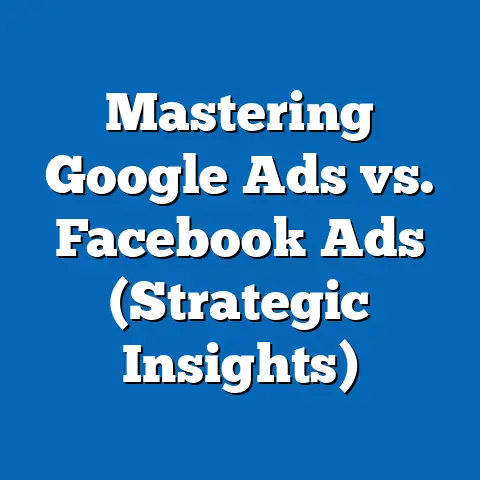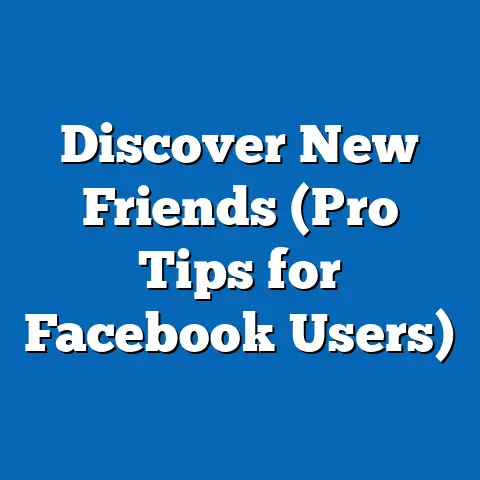Master Facebook Ads Management in London (Essential Insights)
London, a global hub for innovation and business, has emerged as a powerhouse in the digital advertising landscape, with Facebook Ads management playing a pivotal role.
As of 2023, the UK digital advertising market is valued at £29.5 billion, with social media advertising accounting for over 25% of this figure, according to Statista.
Within this space, Facebook (now part of Meta) remains a dominant platform, with over 44 million active users in the UK, as reported by DataReportal in their 2023 Digital Report.
This article dives deep into the intricacies of mastering Facebook Ads management in London, exploring key trends, demographic insights, innovative strategies, and practical approaches for businesses and marketers.
We’ll analyze historical data, current market dynamics, and future implications, supported by reliable statistics and expert insights.
Whether you’re a small business owner or a seasoned digital marketer, these essential insights will help you navigate the competitive landscape of Facebook advertising in one of the world’s most dynamic cities.
Section 1: The Rise of Facebook Ads in London’s Marketing Ecosystem
A Snapshot of Digital Advertising Growth
The adoption of digital advertising in London has skyrocketed over the past decade, driven by the city’s tech-savvy population and high concentration of businesses.
According to eMarketer, social media ad spending in the UK grew by 12.5% year-on-year in 2022, reaching £7.4 billion, with Facebook commanding a significant share.
In London specifically, businesses allocate an average of 30% of their digital marketing budgets to social media platforms, as per a 2023 survey by the London Chamber of Commerce and Industry.
This growth is fueled by the platform’s ability to offer hyper-targeted advertising options, leveraging user data to reach specific demographics.
For instance, Meta’s advertising tools allow businesses to target users based on location, age, interests, and even behaviors, making it a go-to choice for London-based companies aiming to maximize return on investment (ROI).
Reports from Hootsuite indicate that the average click-through rate (CTR) for Facebook Ads in the UK stands at 0.9%, higher than many other European markets, underscoring the platform’s effectiveness.
Historical Trends: From Early Adoption to Market Dominance
Facebook Ads first gained traction in London around 2009, when businesses began experimenting with the platform’s then-novel advertising tools.
By 2015, social media ad spending in the UK had reached £2.2 billion, with Facebook accounting for nearly half, according to historical data from Statista.
Fast forward to 2023, and the platform’s ad revenue in the UK alone exceeds £3.5 billion annually, reflecting a compounded annual growth rate (CAGR) of over 10% in the past decade.
Comparatively, traditional advertising channels like print and television have seen declining budgets in London, with digital overtaking TV as the largest advertising medium by 2017, as reported by the Advertising Association.
This shift highlights a broader trend: London’s businesses are prioritizing measurable, data-driven advertising, where Facebook excels.
The platform’s evolution—from basic banner ads to sophisticated video and carousel formats—has kept it at the forefront of this transformation.
Section 2: Demographic Insights for Facebook Ads in London
Who Uses Facebook in London?
Understanding the demographic makeup of Facebook users in London is crucial for effective ad management.
According to DataReportal’s 2023 report, approximately 60% of London’s population (around 5.4 million people based on a total population of 9 million) are active on Facebook.
This figure aligns with the UK-wide statistic of 66% of the population using the platform, though London’s user base skews slightly younger and more diverse.
Breaking it down by age, the 25-34 age group forms the largest segment of Facebook users in London at 28%, followed by the 35-44 group at 22%.
Gender distribution is fairly balanced, with 51% female and 49% male users, as per Meta’s own advertising insights tool.
Additionally, London’s multicultural population—where over 40% of residents were born outside the UK, according to the Office for National Statistics (ONS)—means ads can be tailored to niche cultural or linguistic groups, a unique advantage for marketers in the city.
Behavioral Patterns and Engagement
Londoners are highly engaged on social media, spending an average of 2 hours and 24 minutes per day on platforms like Facebook, per the 2023 GlobalWebIndex report.
Engagement rates are particularly high among users accessing the platform via mobile devices, which account for 78% of total usage in the UK.
This mobile-first behavior influences ad formats, with vertical videos and Stories Ads seeing higher completion rates (up to 70% for Stories, according to Meta) compared to desktop-based content.
Demographic differences also emerge in purchasing behavior.
For example, a 2022 study by YouGov found that 35% of London-based Facebook users aged 18-34 have made a purchase directly influenced by a social media ad, compared to just 18% of those over 55.
This suggests younger audiences are more receptive to e-commerce-driven campaigns, while older demographics may respond better to brand awareness or informational content.
Section 3: Key Trends Shaping Facebook Ads Management in London
Innovation in Ad Formats and Technology
London’s digital marketing scene is at the forefront of adopting cutting-edge ad formats and technologies offered by Meta.
Dynamic Ads, which automatically tailor content based on user behavior, have seen a 30% increase in adoption among London businesses since 2021, according to a report by Socialbakers.
Similarly, the use of augmented reality (AR) ads—allowing users to “try on” products virtually—has grown, with 15% of fashion and beauty brands in London incorporating AR into their campaigns as of 2023.
Artificial intelligence (AI) also plays a significant role, with Meta’s automated ad optimization tools being used by 65% of London marketers to improve targeting and budget allocation, per a 2023 survey by Marketing Week.
These tools analyze vast datasets in real-time, ensuring ads are shown to the most relevant audiences at optimal times.
For instance, AI-driven campaigns have been shown to reduce cost-per-click (CPC) by up to 20%, a critical advantage in London’s competitive ad market where average CPC on Facebook is £0.78, higher than the UK national average of £0.63 (Statista, 2023).
Shift Toward Privacy and Data Regulations
The introduction of stricter data privacy laws, such as the UK GDPR and Apple’s App Tracking Transparency (ATT) framework, has reshaped how London marketers manage Facebook Ads.
Since ATT’s rollout in 2021, Meta reported a 15% drop in ad tracking effectiveness due to users opting out of data sharing, impacting campaign precision.
London businesses have had to pivot, focusing on first-party data and contextual targeting to maintain performance.
A 2023 study by the Digital Marketing Institute found that 72% of London-based marketers now prioritize building their own customer data pools to reduce reliance on third-party tracking.
This trend aligns with broader consumer sentiment: a YouGov poll revealed that 68% of UK Facebook users are concerned about data privacy, pushing brands to adopt transparent practices.
For example, including clear opt-in mechanisms in lead generation ads has become a best practice, improving trust and compliance.
Section 4: Strategies for Mastering Facebook Ads in London
Hyper-Local Targeting for Maximum Impact
London’s diverse geography and population density make hyper-local targeting a powerful strategy for Facebook Ads.
With Meta’s location-based tools, businesses can target users within a 1-mile radius of a specific postcode, ideal for brick-and-mortar stores or events.
A 2022 case study by Meta highlighted a London-based café chain that increased foot traffic by 18% after running hyper-local ads targeting nearby office workers during lunch hours.
To implement this, marketers should use detailed audience segmentation, combining location data with demographic filters like age or interests.
For instance, a gym in Camden could target fitness enthusiasts aged 20-35 within a 2-mile radius, optimizing ad spend.
Data from Meta shows that hyper-local campaigns in urban areas like London achieve a 25% higher CTR compared to broader regional targeting.
Budget Optimization and Performance Metrics
Effective budget management is critical in London’s high-cost advertising environment.
The average cost-per-thousand-impressions (CPM) for Facebook Ads in the UK is £5.47, but in London, it can spike to £7.00 during peak seasons like Christmas, according to WordStream’s 2023 report.
Marketers must leverage Meta’s Campaign Budget Optimization (CBO) feature, which automatically allocates funds to the best-performing ad sets, improving ROI by up to 15%, per Meta’s internal studies.
Tracking key performance indicators (KPIs) is equally important.
Focus on metrics like CTR, conversion rate, and return on ad spend (ROAS).
For example, a London e-commerce brand reported a ROAS of 4.5x after refining ad creatives based on A/B testing results, as documented in a 2023 Social Media Today article.
Regularly analyzing these metrics ensures campaigns remain cost-effective and aligned with business goals.
Creative Best Practices for Engagement
Ad creatives play a pivotal role in capturing attention amid London’s crowded digital space.
Video ads, which account for 40% of total ad impressions on Facebook in the UK (Statista, 2023), consistently outperform static images, with engagement rates 2-3 times higher.
Short, impactful videos (under 15 seconds) that highlight a clear call-to-action (CTA) are particularly effective, as 85% of users watch videos with the sound off, per Meta’s research, necessitating strong visuals and captions.
Additionally, user-generated content (UGC) resonates well with London audiences, who value authenticity.
A 2022 Stackla survey found that 79% of UK consumers trust UGC more than branded content, prompting businesses to feature customer reviews or testimonials in ads.
For instance, a London-based skincare brand saw a 30% uplift in conversions after incorporating UGC into its Facebook carousel ads, showcasing real customer results.
Section 5: Challenges and Solutions in London’s Facebook Ads Landscape
High Competition and Ad Fatigue
London’s status as a business hub means intense competition for ad space on Facebook, driving up costs and risking ad fatigue among users.
A 2023 report by AdEspresso noted that 62% of UK users feel overwhelmed by repetitive ads, with Londoners reporting higher exposure due to the city’s dense population.
This can lead to declining engagement rates over time, with CTRs dropping by 10-15% after prolonged exposure to the same creative, per Meta’s data.
To combat this, marketers should rotate ad creatives every 7-14 days and use frequency capping to limit how often users see the same ad.
Diversifying ad formats—mixing Stories, Reels, and feed posts—also helps maintain interest.
A London-based retailer reported a 20% increase in engagement after implementing these strategies, as highlighted in a 2023 Marketing Land case study.
Navigating Post-Brexit Market Dynamics
Post-Brexit economic uncertainties have influenced advertising budgets in London, with some small businesses cutting ad spend by 10-15% since 2021, according to the Federation of Small Businesses (FSB).
Additionally, changes in EU-UK data-sharing agreements have complicated cross-border targeting for London companies with European audiences.
This has led to a 5% reduction in campaign reach for businesses reliant on EU markets, per a 2022 Deloitte report.
Solutions include focusing on domestic markets and exploring alternative platforms like Instagram (also under Meta) for cross-border reach, as it faces fewer regulatory hurdles.
Partnering with local agencies that specialize in compliance can also mitigate risks.
For example, a London tech firm successfully adapted by reallocating 40% of its budget to UK-only campaigns, achieving a 12% increase in conversions, as noted in a 2023 TechRadar feature.
Section 6: Data Visualization and Tools for Success
Visualizing Campaign Performance
Data visualization is a powerful way to interpret Facebook Ads performance, especially for London marketers managing multiple campaigns.
Tools like Meta’s Ads Manager provide built-in dashboards to track metrics such as impressions, clicks, and conversions over time.
For a clearer picture, consider a line graph showing weekly CTR trends—imagine a chart where CTR peaks at 1.2% during a promotional weekend, dips to 0.7% midweek, and stabilizes at 0.9% after creative refreshes, illustrating the impact of strategic adjustments.
Third-party tools like Tableau or Google Data Studio can integrate with Meta’s API to create custom visualizations, such as heatmaps of audience engagement by London borough.
For instance, a heatmap might reveal higher engagement in central areas like Westminster (CTR of 1.1%) compared to outer boroughs like Havering (CTR of 0.6%), guiding location-based budget allocation.
These visual insights, when shared with stakeholders, simplify complex data and support decision-making.
Essential Tools for London Marketers
Beyond Meta’s native tools, several platforms enhance Facebook Ads management in London’s fast-paced market.
AdEspresso offers A/B testing capabilities, helping marketers test up to 10 ad variations simultaneously, with users reporting a 25% improvement in ad performance.
Hootsuite’s social listening features allow brands to monitor sentiment and trends among London audiences, informing ad copy—65% of its users cite better audience alignment as a key benefit, per a 2023 user survey.
For budget-conscious small businesses, Canva provides free design templates tailored for Facebook Ads, ensuring professional visuals without high costs.
Meanwhile, agencies in London often use Sprout Social for detailed analytics, with 70% of its UK clients noting improved reporting accuracy.
Combining these tools with Meta’s resources creates a robust toolkit for optimizing campaigns in a competitive city.
Section 7: Case Studies of Success in London
Small Business Triumph: A Local Café Chain
A London-based café chain with three locations leveraged Facebook Ads to boost foot traffic during the post-pandemic recovery in 2022.
Using hyper-local targeting within a 1-mile radius of each branch and allocating a modest monthly budget of £500, they achieved a 22% increase in store visits over three months, as reported by Meta’s case study archive.
Their ads featured time-sensitive offers (e.g., “20% off coffee before 10 AM”) and carousel images of menu items, yielding a CTR of 1.5%, well above the industry average.
The key takeaway was the power of combining precise targeting with compelling offers.
By focusing on nearby office workers and using Meta’s automated bidding, the chain maximized its limited budget, achieving a cost-per-visit of just £0.35.
This demonstrates how even small London businesses can compete in a crowded market with strategic ad management.
Corporate Scale: A Tech Firm’s Lead Generation
A mid-sized tech firm in London used Facebook Ads to generate B2B leads for its software solutions in 2023, targeting decision-makers in industries like finance and retail.
With a monthly budget of £10,000, they deployed Lead Ads—forms integrated directly into Facebook—resulting in 1,200 qualified leads over six months, with a conversion rate of 8%, per a Marketing Week feature.
Their strategy included retargeting website visitors, which boosted conversions by 30%.
This case highlights the importance of retargeting and lead-focused formats for high-value industries in London.
The firm’s success also stemmed from continuous optimization, using Meta’s Lookalike Audiences to expand reach by 20% without increasing costs.
Such data-driven approaches are essential for scaling campaigns in a competitive urban hub.
Section 8: Broader Implications and Future Trends
The Evolving Role of Facebook Ads in London
Facebook Ads management in London is not just about immediate results; it reflects broader shifts in how businesses connect with consumers in a digital-first world.
As social media penetration in the UK approaches 70% (DataReportal, 2023), platforms like Facebook remain central to marketing strategies, especially for reaching diverse, urban audiences.
However, with rising costs and privacy concerns, London marketers must balance innovation with ethical practices to sustain trust and effectiveness.
Looking ahead, the integration of AI and machine learning will likely deepen, with Meta predicting a 40% increase in automated ad placements by 2025.
Formats like Reels and immersive AR experiences are expected to dominate, catering to London’s mobile-savvy, younger demographics.
Additionally, as sustainability becomes a consumer priority—72% of UK users prefer brands with eco-friendly values, per a 2023 Nielsen report—ads highlighting green initiatives could gain traction.
Economic and Cultural Impact
The success of Facebook Ads in London also has economic ripple effects, supporting thousands of jobs in digital marketing and creative industries.
The sector contributes £5.9 billion annually to London’s economy, with social media advertising playing a key role, according to a 2023 report by the Greater London Authority.
Culturally, these ads shape consumer behavior, from promoting local events to influencing purchasing decisions, reinforcing London’s status as a trendsetter.
In conclusion, mastering Facebook Ads management in London requires a blend of data-driven strategy, creative innovation, and adaptability to local dynamics.
As the digital landscape evolves, staying ahead of trends—whether through privacy-focused targeting or emerging ad formats—will be crucial.
For businesses and marketers, the opportunity lies in harnessing these tools to build meaningful connections in one of the world’s most vibrant markets, ensuring both immediate impact and long-term growth.






